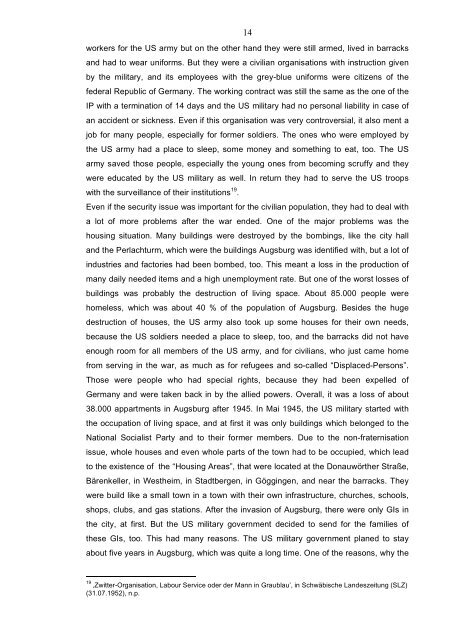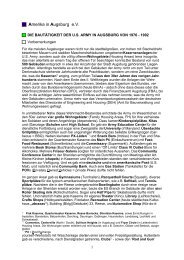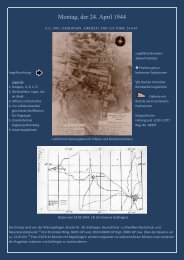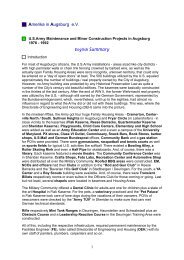FACHARBEIT Englisch - Amerika in Augsburg
FACHARBEIT Englisch - Amerika in Augsburg
FACHARBEIT Englisch - Amerika in Augsburg
You also want an ePaper? Increase the reach of your titles
YUMPU automatically turns print PDFs into web optimized ePapers that Google loves.
14<br />
workers for the US army but on the other hand they were still armed, lived <strong>in</strong> barracks<br />
and had to wear uniforms. But they were a civilian organisations with <strong>in</strong>struction given<br />
by the military, and its employees with the grey-blue uniforms were citizens of the<br />
federal Republic of Germany. The work<strong>in</strong>g contract was still the same as the one of the<br />
IP with a term<strong>in</strong>ation of 14 days and the US military had no personal liability <strong>in</strong> case of<br />
an accident or sickness. Even if this organisation was very controversial, it also ment a<br />
job for many people, especially for former soldiers. The ones who were employed by<br />
the US army had a place to sleep, some money and someth<strong>in</strong>g to eat, too. The US<br />
army saved those people, especially the young ones from becom<strong>in</strong>g scruffy and they<br />
were educated by the US military as well. In return they had to serve the US troops<br />
with the surveillance of their <strong>in</strong>stitutions 19 .<br />
Even if the security issue was important for the civilian population, they had to deal with<br />
a lot of more problems after the war ended. One of the major problems was the<br />
hous<strong>in</strong>g situation. Many build<strong>in</strong>gs were destroyed by the bomb<strong>in</strong>gs, like the city hall<br />
and the Perlachturm, which were the build<strong>in</strong>gs <strong>Augsburg</strong> was identified with, but a lot of<br />
<strong>in</strong>dustries and factories had been bombed, too. This meant a loss <strong>in</strong> the production of<br />
many daily needed items and a high unemployment rate. But one of the worst losses of<br />
build<strong>in</strong>gs was probably the destruction of liv<strong>in</strong>g space. About 85.000 people were<br />
homeless, which was about 40 % of the population of <strong>Augsburg</strong>. Besides the huge<br />
destruction of houses, the US army also took up some houses for their own needs,<br />
because the US soldiers needed a place to sleep, too, and the barracks did not have<br />
enough room for all members of the US army, and for civilians, who just came home<br />
from serv<strong>in</strong>g <strong>in</strong> the war, as much as for refugees and so-called “Displaced-Persons”.<br />
Those were people who had special rights, because they had been expelled of<br />
Germany and were taken back <strong>in</strong> by the allied powers. Overall, it was a loss of about<br />
38.000 appartments <strong>in</strong> <strong>Augsburg</strong> after 1945. In Mai 1945, the US military started with<br />
the occupation of liv<strong>in</strong>g space, and at first it was only build<strong>in</strong>gs which belonged to the<br />
National Socialist Party and to their former members. Due to the non-fraternisation<br />
issue, whole houses and even whole parts of the town had to be occupied, which lead<br />
to the existence of the “Hous<strong>in</strong>g Areas”, that were located at the Donauwörther Straße,<br />
Bärenkeller, <strong>in</strong> Westheim, <strong>in</strong> Stadtbergen, <strong>in</strong> Gögg<strong>in</strong>gen, and near the barracks. They<br />
were build like a small town <strong>in</strong> a town with their own <strong>in</strong>frastructure, churches, schools,<br />
shops, clubs, and gas stations. After the <strong>in</strong>vasion of <strong>Augsburg</strong>, there were only GIs <strong>in</strong><br />
the city, at first. But the US military government decided to send for the families of<br />
these GIs, too. This had many reasons. The US military government planed to stay<br />
about five years <strong>in</strong> <strong>Augsburg</strong>, which was quite a long time. One of the reasons, why the<br />
19<br />
‚Zwitter-Organisation, Labour Service oder der Mann <strong>in</strong> Graublau’, <strong>in</strong> Schwäbische Landeszeitung (SLZ)<br />
(31.07.1952), n.p.






